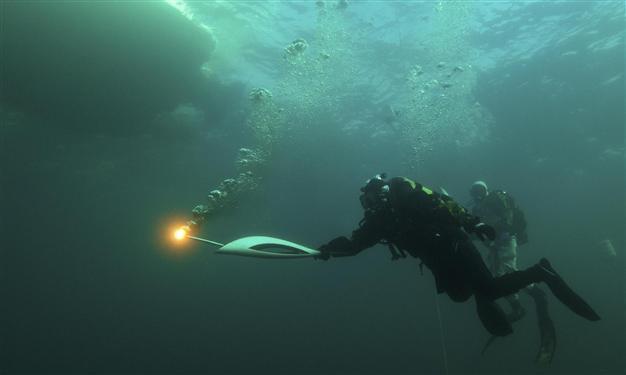Olympic flame plunges into Russia's lake Baikal
MOSCOW - Agence France-Presse

A torchbearer dives with the 2014 Sochi Winter Olympic Games torch in Lake Baikal in this handout from the Organizing Committee Sochi 2014 released on November 23, 2013. REUTERS Photo
Russia on Saturday took the Olympic flame into its scenic lake Baikal, the world's deepest body of fresh water, in the latest dramatic torch relay ahead of the Sochi Winter Games.
State television showed a torchbearer on a boat belonging to Russia's emergency ministry light a special water-resistant torch held by a man in the water in full diving gear.
The flame, turning into a bright pink flare, was shown disappearing into the dark depths of Baikal, a long lake straddling two Siberian regions that contains 20 percent of the world's fresh water.
After coming back up to the surface, the flame was carried to land by another torchbearer wearing a jet-propelled pack, who flew across the lake to a platform on the shore to cheers and clapping.
"This water has its own force, its own energy," said rescue worker Nikolai Rybachenko, one of the three divers who were involved in the underwater relay.
The lake at its deepest point is 1,642 metres (5,387 feet). The Sochi organising committee said later the divers descended to a depth of 13 metres. Baikal, sometimes called "the Baikal Sea" for its vastness, is a major tourist destination and home to several unique species like the Baikal freshwater seal. It is also known for having its own fickle climate, with sudden storms frequently ravaging its waters, and the Saturday dive was delayed due to dangerous waves.
The Sochi Games organisers published photographs of two scuba divers with long fins and oxygen tanks doing a flame handover underwater, their torches apparently equipped with a special extention that allows burning in water.
The feat was possible due to a "special burner similar to a hand flare used to give signals at sea" powered by a "rubber-based pyrotechnic shell," the Sochi Organising Committee said.
The Irkutsk region's town Listvyanka, where the dive took place, currently has temperatures of minus three degrees Celcius.
Russia hosts the Games in its Black Sea resort of Sochi in February. The event has already broken records in terms of the costs of its preparation, with a total budget of more than $50 billion (36 million euros). Preparations for the global event have been slammed by critics, who say the Games are a vanity project for President Vladimir Putin at the expense of Sochi's pristine mountain wilderness and rights of locals and migrant labourers.
Recent anti-gay initiatives by Moscow, such as the law against "gay propaganda" to minors passed this summer, have even seen Western gay rights groups call for a boycott of the Games.
The flame has already traveled to easternmost Russia and as far north as the North Pole as Russia uses the relay to showcase its geographical expanse and technological prowess -- even sending one of the unlit Olympic torches into space earlier this month and taking it on a spacewalk.
On Friday the relay went to Russia's Buddhist region of Buryatia where monks took the torch around their sacred temple in the direction of the sun, according to organisers.
The flame's next notable destination is the top of Mount Elbrus, the highest peak in Europe located in Russia's North Caucasus. It will then light the Olympic cauldron in Sochi on February 7, 2014.
